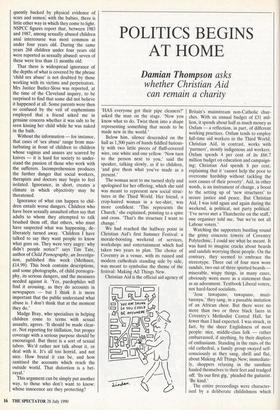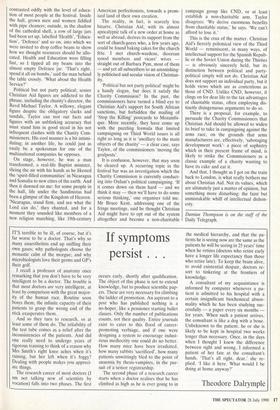POLITICS BEGINS AT HOME
Damian Thompson asks
whether Christian Aid can remain a charity
'HAS everyone got their pipe cleaners?' asked the man on the stage. 'Now you know what to do. Twist them into a shape representing something that needs to be made new in the world.'
Below him, silence descended on the hall as 1,500 pairs of hands fiddled furious- ly with two little pieces of fluff-covered wire, one white and one yellow. 'Now turn to the person next to you,' said the speaker, talking slowly, as if to children, 'and give them what you've made as a present.'
The woman next to me turned shyly and apologised for her offering, which she said was meant to represent new social struc- tures in the Third World. Her friend, a crop-haired woman in a tee-shirt, was more confident. 'This represents the Church,' she explained, pointing to a spire and cross. 'That's the structure I want to change.'
We had reached the halfway point in Christian Aid's first Summer Festival: a morale-boosting weekend of services, workshops and entertainment which had taken two years to plan. The choice of Coventry as a venue, with its ruined and modern cathedrals standing side by side, was meant to symbolise the theme of the festival: Making All Things New.
Christian Aid is the official aid agency of Britain's mainstream non-Catholic chur- ches. With an annual budget of £31 mil- lion, it spends about half as much money as Oxfam — a reflection, in part, of different working practices. Oxfam tends to employ full-time aid workers in the Third World; Christian Aid, in contrast, works with 'partners', mostly indigenous aid workers. Oxfam spends 4 per cent of its £66.7 million budget on education and campaign- ing; Christian Aid spends 8 per cent, explaining that it 'cannot help the poor to overcome hardship without tackling the root causes of their poverty'. Aid, in other words, is an instrument of change, a boost to the setting up of 'new structures' to secure justice and peace. But Christian Aid, I was told again and again during the weekend, is political, not party political. 'I've never met a Thatcherite on the staff,' one organiser told me, 'but we're not all Labour voters.'
Watching the supporters bustling round the grimy concrete towers of Coventry Polytechnic, I could see what he meant. It was hard to imagine cracks about beards and sandals worrying these people. On the contrary, they seemed to embrace the stereotype. Three out of four men wore sandals, two out of three sported beards miserable, wispy things, in many cases, obviously worn more as a statement than as an adornment. Textbook Liberal voters, not hard-faced socialists.
'Jesu tawapano, tawapano, muzi- tarenyu,' they sang, in a passable imitation of an African choir. But there were no more than two or three black faces in Coventry's Methodist Central Hall, far fewer than I had expected. I was struck, in fact, by the sheer Englishness of most people: nice, middle-class folk — rather embarrassed, if anything, by their displays of enthusiasm. Standing in the ruins of the old cathedral, a family group swayed self- consciously as they sang, shrill and flat, about Making All Things New; immediate- ly, shoppers relaxing in the sunshine hauled themselves to their'feet and trudged off. 'Its our first gig,' pleaded the guitarist. 'Be kind.'
The entire proceedings were character- ised by a deliberate childishness which contrasted oddly with the level of educa- tion of most people at the festival. Inside the hall, grown men and women fiddled with pipe cleaners; outside, in the shadow of the cathedral shell, a row of large jars had been set up, labelled 'Health', 'Educa- tion', 'Defence' and so on, into which we were invited to drop coffee beans to show how we thought resources should be allo- cated. Health and Education were filling fast, so I tipped all my beans into the almost empty Defence jar. 'That's right, spend it all on bombs,' said the man behind the table crossly. 'What about the Health Service?'
Political but not party political; senior Christian Aid figures are addicted to the phrase, including the charity's director, the Revd Michael Taylor. A willowy, elegant figure despite the obligatory slacks and sandals, Taylor can trot out facts and figures with an unblinking accuracy that must stand him in good stead in his not infrequent clashes with the Charity Com- missioners. His cool manner is a bit intimi- dating; in another life, he could just as easily be a spokesman for one of the multinational companies he opposes.
On stage, however, he was a man transformed, a real-life Baptist minister, slicing the air with his hands as he likened the 'spirit-filled communities' in Nicaragua and Somalia to new cities of the earth. And then it dawned on me: for some people in the hall, life under the Sandinistas had been a glimpse of the Kingdom of Heaven. 'Nicaragua, stand firm, and see what the Lord can do,' they chanted, and for a moment they sounded like members of a new religion marching, like 19th-century American perfectionists, towards a prom- ised land of their own creation.
The reality, in fact, is scarcely less bizarre. Christian Aid, with its almost apocalyptic talk of a new order at home as well as abroad, derives its support from the sort of church-goers who, a few years ago, could be found baking cakes for the church fete. I met church-wardens, diocesan synod members and vicars' wives straight out of Barbara Pym, most of them — and yet all subscribers to an astonishing- ly politicised and secular vision of Christian- ity.
'Political but not party political' might be a handy slogan, but does it satisfy the Charity Commission? In the past, the commissioners have turned a blind eye to Christian Aid's support for South African sanctions, but forbidden the mailing of 'Stop the Killing' postcards to Mozambi- que. More recently, they have come up with the puzzling formula that limited campaigning on Third World issues is all right so long as it is 'ancillary to the main objects of the charity' — a clear case, says Taylor, of the commissioners 'moving the goalposts'.
It is confusion, however, that may soon be cleared up. A recurring topic in the festival bar was an investigation which the Charity Commission is currently conduct- ing into Oxfam's political campaigning. 'If it comes down on them hard — and we think it may — then we'll have to do some serious thinking,' one organiser told me. Mr Bruce Kent, addressing one of the fringe meetings, said he thought Christian Aid might have to opt out of the system altogether and become a non-charitable campaign group like CND, or at least establish a non-charitable arm. Taylor disagrees: 'We derive enormous benefits from charitable status,' he says. 'We can't afford to lose it.'
This is the crux of the matter. Christian Aid's fiercely polemical view of the Third World — reminiscent, in many ways, of intellectual support for the Spanish Repub-
lic or the Soviet Union during the Thirties — is obviously sincerely held, but its distinction between political and party- political simply will not do. Christian Aid does not support an individual party, but it holds views which are as contentious as those of CND. Unlike CND, however, it clings on for dear life to the tax advantages of charitable status, often employing dis- tinctly disingenuous arguments to do so.
There is a proposal, for example, to persuade the Charity Commissioners that Christian Aid should be allowed to widen its brief to take in campaigning against the arms race, on the grounds that arms manufacturers are, effectively, 'sabotaging development work': a piece of sophistry which in their present frame of mind, is likely to strike the Commissioners as a classic example of a charity wanting to have its cake and eat it.
And that, I thought as I got on the train back to London, is what really bothers me about Christian Aid. Not its values, which are ultimately just a matter of opinion, but something more disturbing: the faint but unmistakable whiff of intellectual dishon- esty.
Damian Thompson is on the staff of the Daily Telegraph.



















































 Previous page
Previous page